Local hospitals and the summer season: Fish hooks, heart attacks, heat exhaustion
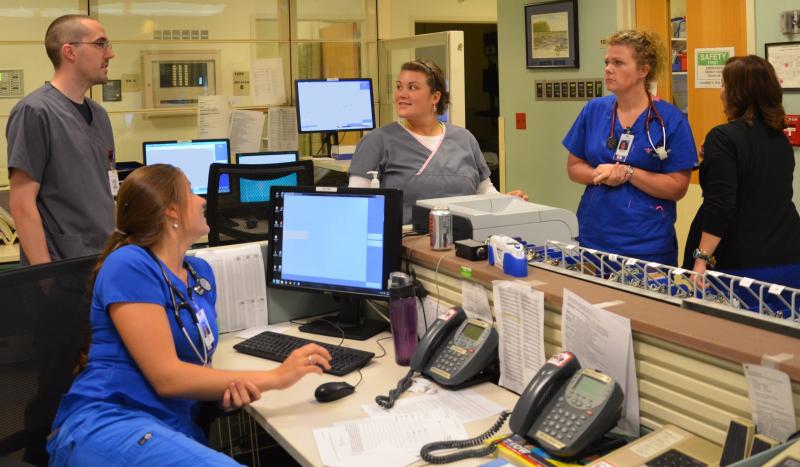 Staff at Pen Bay Medical Center in Rockport keep an eye on monitors in the emergency department’s operations hub. Pen Bay’s ED staff comprises 12 doctors, 20 nurses and eight technicians. Here, Eric Davis, Katie Holmes, Kayla Gushee, Stephanie and Aimee Lash-Radic get ready for the changing of the guard. (Photo by Lynda Clancy)
Staff at Pen Bay Medical Center in Rockport keep an eye on monitors in the emergency department’s operations hub. Pen Bay’s ED staff comprises 12 doctors, 20 nurses and eight technicians. Here, Eric Davis, Katie Holmes, Kayla Gushee, Stephanie and Aimee Lash-Radic get ready for the changing of the guard. (Photo by Lynda Clancy)
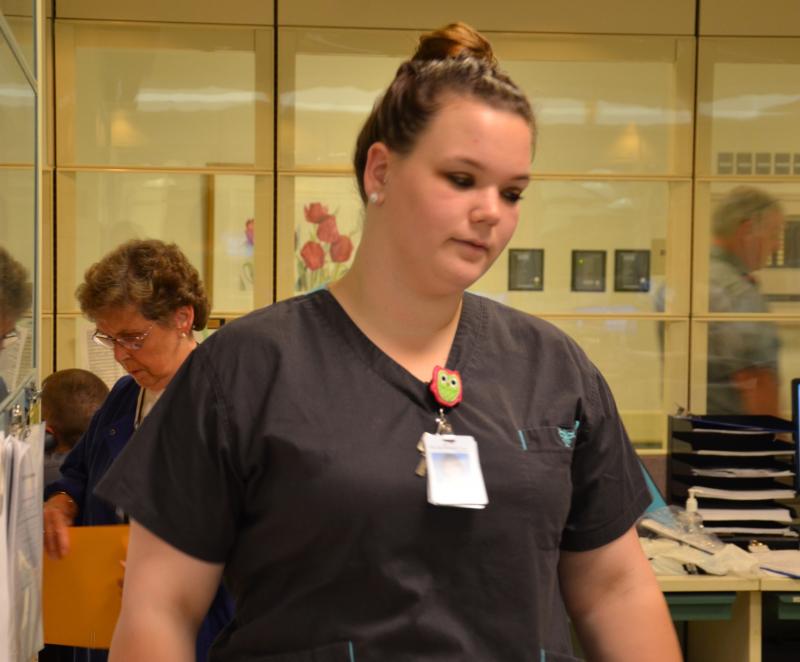 Kara Dow (front), and Joan Garrigan (back). (Photo by Lynda Clancy)
Kara Dow (front), and Joan Garrigan (back). (Photo by Lynda Clancy)
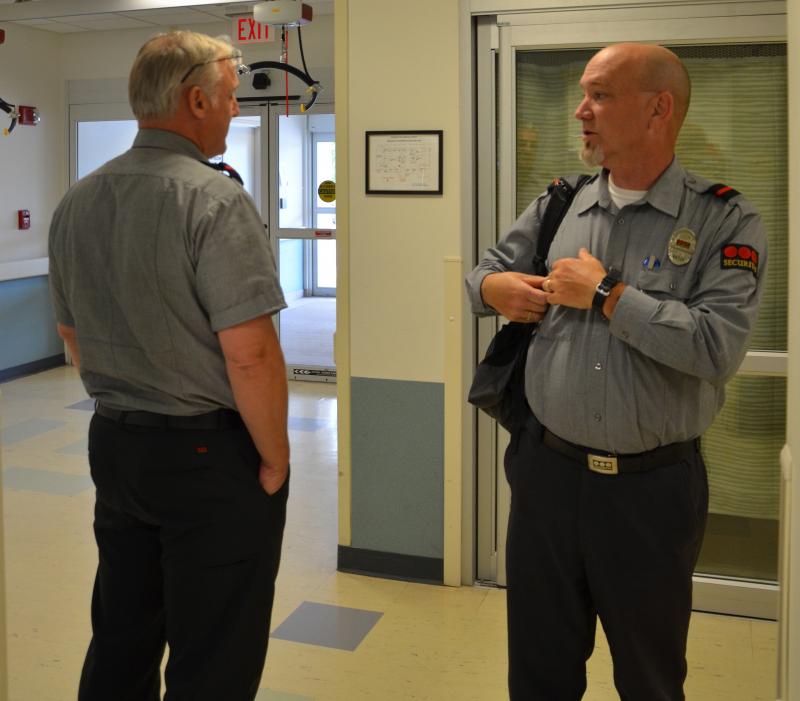 Pen Bay security guards brief each other in the changing of the guard. (Photo by Lynda Clancy)
Pen Bay security guards brief each other in the changing of the guard. (Photo by Lynda Clancy)
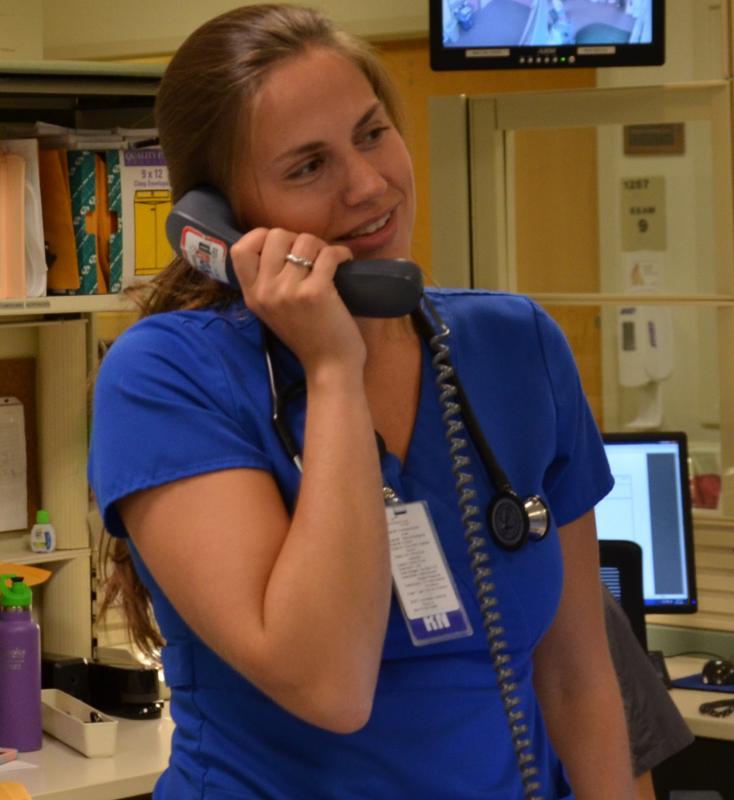 Pen Bay Medical Center’s Katie Holm in the emergency department. (Photo by Lynda Clancy)
Pen Bay Medical Center’s Katie Holm in the emergency department. (Photo by Lynda Clancy)
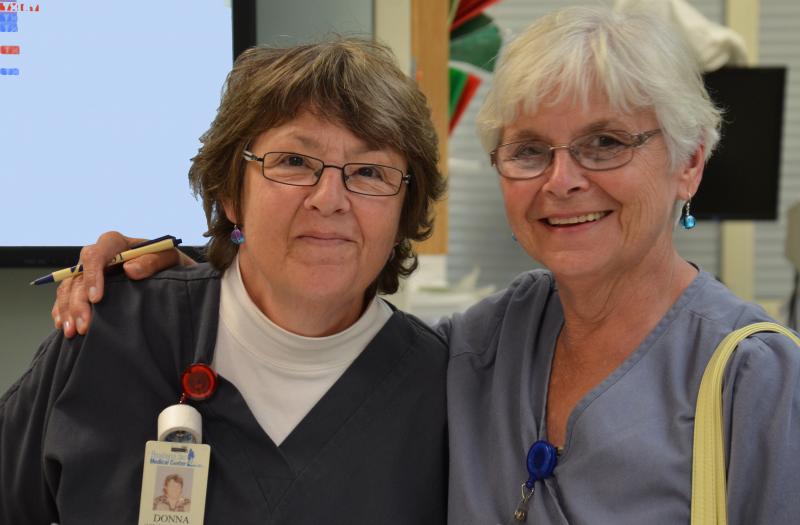 Donna Kessler and Barbara Hilt. Barbara trained Donna in 2002. Barbara has retired but comes back in on a per diem basis. It’s in her blood to help people. (Photo by Lynda Clancy)
Donna Kessler and Barbara Hilt. Barbara trained Donna in 2002. Barbara has retired but comes back in on a per diem basis. It’s in her blood to help people. (Photo by Lynda Clancy)
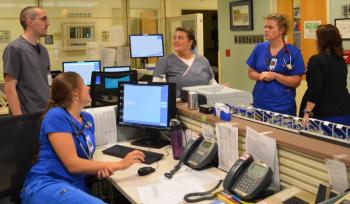 Staff at Pen Bay Medical Center in Rockport keep an eye on monitors in the emergency department’s operations hub. Pen Bay’s ED staff comprises 12 doctors, 20 nurses and eight technicians. Here, Eric Davis, Katie Holmes, Kayla Gushee, Stephanie and Aimee Lash-Radic get ready for the changing of the guard. (Photo by Lynda Clancy)
Staff at Pen Bay Medical Center in Rockport keep an eye on monitors in the emergency department’s operations hub. Pen Bay’s ED staff comprises 12 doctors, 20 nurses and eight technicians. Here, Eric Davis, Katie Holmes, Kayla Gushee, Stephanie and Aimee Lash-Radic get ready for the changing of the guard. (Photo by Lynda Clancy)
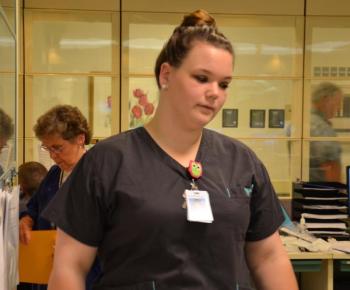 Kara Dow (front), and Joan Garrigan (back). (Photo by Lynda Clancy)
Kara Dow (front), and Joan Garrigan (back). (Photo by Lynda Clancy)
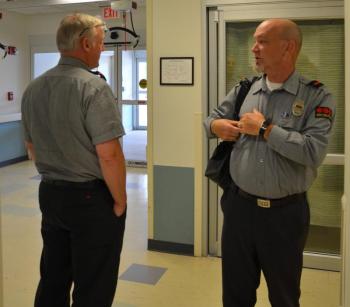 Pen Bay security guards brief each other in the changing of the guard. (Photo by Lynda Clancy)
Pen Bay security guards brief each other in the changing of the guard. (Photo by Lynda Clancy)
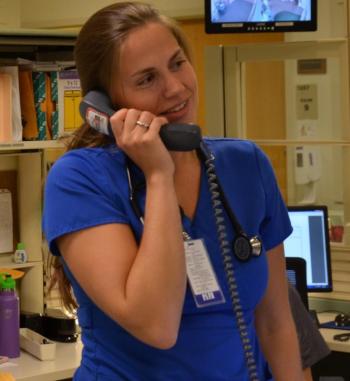 Pen Bay Medical Center’s Katie Holm in the emergency department. (Photo by Lynda Clancy)
Pen Bay Medical Center’s Katie Holm in the emergency department. (Photo by Lynda Clancy)
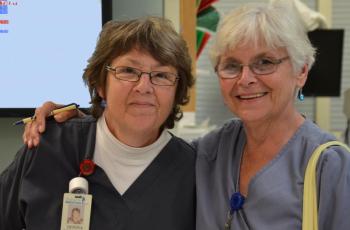 Donna Kessler and Barbara Hilt. Barbara trained Donna in 2002. Barbara has retired but comes back in on a per diem basis. It’s in her blood to help people. (Photo by Lynda Clancy)
Donna Kessler and Barbara Hilt. Barbara trained Donna in 2002. Barbara has retired but comes back in on a per diem basis. It’s in her blood to help people. (Photo by Lynda Clancy)
The summer season. Summer along Midcoast Maine is a time of fun, generally involving sailing, eating lobster, hiking, making art, swimming or spreading the picnic blanket on the lawn next to the concert stage. It is a time of relaxation and carefree thoughts. Until someone gets hurt or sick, like getting a fishing lure hooked in a finger.
In fact, Penobscot Bay Medical Center, in Rockport, sees a noticeable uptick of fishing lures protruding from patient's skin during the summer. And, those fishermen are just as concerned about keeping their best lures intact as they are of removing those prized lures from their bodies, according to Dr. Chris Michalakes, Medical Director of Pen Bay Medical Center.
It’s a delicate operation.
In a perfect world, no cloud could produce a shadow on the summertime fun, yet clouds are a part of life. This is why plans are created and structured environments, such as hospital emergency rooms, exist. People do get hurt and ill during the summer, and it is the public health system that for the better part of time, ensures recovery.
"Our average daily patient volume is 39 patients," says Kim Spectre, Registered Nurse Emergency Department Nurse Manager of Waldo County General Hospital (WCGH). "However, in the summer months our daily patient volume increases to average 46 patients." The average amount of patients seen in the WCGH emergency room in the winter is 1,100. The summer season bumps the number to 1,600.
But what sends locals and tourists to the emergency departments in Rockport and Belfast during the summer? What makes people get sick?
Rockland's Lobster Festival draws far more incidences of heat exposure, cuts, bruises, and chest pains to Pen Bay's 12-exam room emergency department than the Blues Festival, Schooner Days, or Maine Boats and Harbors Show. The emergency department also cares for patients of the few cruise ships which dock here each summer. Chronic sickness, heart attacks, and hip fractures are not uncommon diagnoses of ship passengers.
Hand injuries from boat motors, and swimming related-ailments lead the list of expected injuries caused by athletes, artists, boaters, and festival attendees in the Camden/Rockland area.
Twenty miles up the road, WCGH, with its nine emergency department exam rooms, sees an increase in broken bones, lacerations and burns, as well as car and motorcycle accidents, according to Spectre.
Though July is the busiest month for WCGH, organized events do not reflect the emergency department’s influx.
When the Father's Day Trek Across Maine ended in Belfast this June, 3,000 bicyclists pedaled into town, along with an estimated 2,000 family and friends. Fewer patients (37) were seen in the emergency department that day than the summer daily average (46). Not one of the patients seen that day had ties to the bicycling event.
Neither the Celtic Festival nor Arts in the Park draw an influx of patients. However, a 2012 Belmont music and arts event called BelTek Festival, featuring such bands as “Jerkface” and ”Who Cares,” resulted in an increase in illicit drug-related visits to WCGH.
Pen Bay, which averages 22,000 emergency department visits per year, does see a correlation between the bump in summer emergency department traffic and Camden/Rockland events.
"Anytime large amounts of people converge, there are bound to be ailments, according to Roxie Walton, Registered Nurse Emergency Department Nurse Manager at Pen Bay Medical Center.
In anticipation of each summer season, Pen Bay increases the amount of physicians and nurses by offering part-time workers more hours, and by digging into the registered nurse float pool.
The medical facility also meets with the medical community and first responders of Knox County for a one-day Table Top workshop. At the workshop, they review their catastrophic-event strategies, such as where to land a life-flight helicopter if needed.
Waldo County General Hospital increases nurses from four to five on some of the busier days of the summer.
Mondays and Fridays seem to be busier than other days of the week. Therefore, a fifth nurse comes in at 10 a.m. and works until 10 p.m on those days, according to Spectre. "We've also increased the hours of our night emergency department tech from 1 a.m. to 3 a.m. This helps to have another pair of hands for the night staff and to help keep an eye on the waiting room as patients present to be seen."
Spectre’s observations line up with a study done by an Emergency Medicine Magazine article published in 2002. According to the Emergency study, ”Most accident and emergency attendances were made on a Monday. This phenomenon was found in all age groups except the very young. Many of these may be because people who injure themselves at the weekend do not visit emergency departments immediately, as they do not the consider themselves to need immediate treatment. They then seek attention later.”
New to WCGH this summer is a tenth room or "fast track" area to allow the emergency department providers to see patients with low acuity complaints (i.e. suture removal, tick bites, minor sprains etc.). The goal is to decrease the patient's length of stay for all patients. "We believe this newly created "Fast Track" area will help us work towards this goal," Spectre says.
The decline of tourists to the area of past years has been reflected in Pen Bay's patient census. However, the decreasing gas prices this summer are allowing road trippers to return. Also on the rise is the number of retirees moving back to the area to be near loved ones as well as the ocean. This increase brings more primary physicians and more non-urgent options for locals and tourists alike.
The Belfast community is also seeing an increase in retirees, vacationers and summer residents, all of whom frequent the emergency department for one reason or another. Many of the summer residents and vacationers do not have a local Primary Care Provider, so the emergency department becomes the de facto provider.
Though WCGH is seeing a downward trend downward trend in yearly patient volumes since 2011 — by July 2014, the emergency department has only seen 1,276 patients — the patient acuity is increasing.
Since 2005, the WCGH emergency department has increased patient transfers to a tertiary facility from an average of eight per month to an average of 16 per month. There is also an upward trend of mental health patients transferred to mental health facilities from four in July of 2005 to 15 this July.
Reach Sarah Thompson at news@penbaypilot.com.
Event Date
Address
United States































